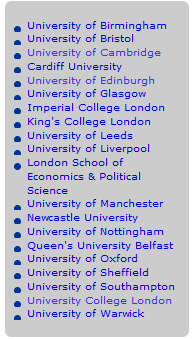|
|
|
|
|
|
|
News & Views item - January 2009 |
![]() The Agonising Over Britain's RAE Continues. (January 22, 2009)
The Agonising Over Britain's RAE Continues. (January 22, 2009)
| The Russell Group |
 |
The grading for Britain's Research Assessment Exercise, 2008 (RAE 2008) was announced this past December1, 2, and while the final allocations of the £1.5 billion annual funding on offer from the Higher Education Funding Council for England (Hefce) are not due to be announced until 4 March, The Guardian reports vice-chancellors are already lobbying for their financial futures.
Vice-chancellors of big, research-intensive universities, the Russell group, are particularly agitated claiming that without continued selectivity - at the moment 29 of the 159 universities in the mix receive 82% of Hefce's research funding - the UKs "world-class universities with the capacity to compete globally will be jeopardised". Their panic stems from the finding by the RAE that over half the research (54%) submitted in 2008 deemed to be either world-leading (4*) or internationally excellent (3*) - are found in 150 of 159 universities.
Professor Michael Arthur, vice-chancellor of the University of Leeds (a member of the Russell group) is quoted in The Guardian:
[UK government] Ministers understand the importance of research selectivity and concentration and having world-class universities, particularly as a mechanism to accelerate out of the bottom end of the recession and gain advantage. But whether that will translate through, we don't know. Other VCs are saying this is classic Russell group protectionism, but take it to its extreme and you end up with lots of universities in the middle and nobody at world-class level. That would be bad for the country.
If I had £9m and nine faculties, I wouldn't distribute the money willy-nilly, I would want to concentrate on clever ideas. I'm very worried about the selectivity curve flattening off - where the bottom end gains money but not enough to compete on the world-class stage, and others don't have sufficient funding to maintain world-class environments and staffing levels and [the country's competitive edge] drops away.
On the other hand Paul Marshall, executive director of the eighteen-member 1994 group of smaller research-intensive institutions, says: "RAE 2008 was run on the new profile system precisely to identify excellence more sensitively and wherever it was found. Hefce must now fund on that basis."
What is striking in the rhetoric of the Russell group just as it is with Australia's Group of Eight is the repeated references to the university as though it were a super entity above and apart from its research staff. And that is nonsense which up until now the the nations' political masters have accepted as gospel.
The quality of research groups whether large or small is determined by the individuals comprising them. And the best students look to the reputations and accomplishments of the groups and their principle investigators. Of course there is a correlation between the ranking of a university and the quality of its researchers. However, a quick run down of the Nobel Laureates at US universities demonstrates -- just as this year the UK's RAE 2008 shows -- the correlations between top ranked universities and research deemed to be of the highest quality is far from absolute.
And the best graduate students determine to whom they apply on the basis of the PI with whom they want to work not where he is located.